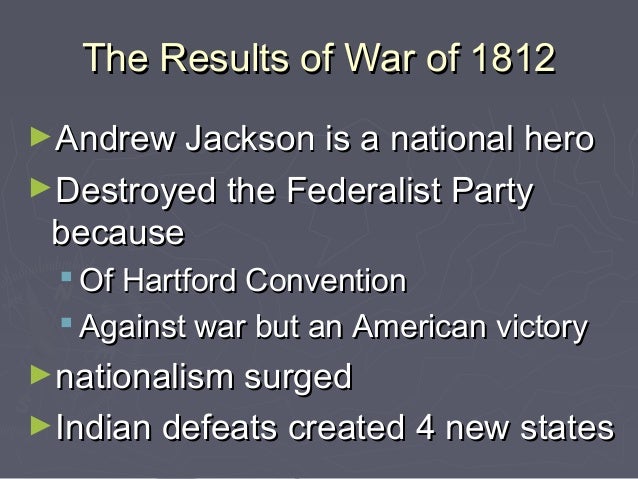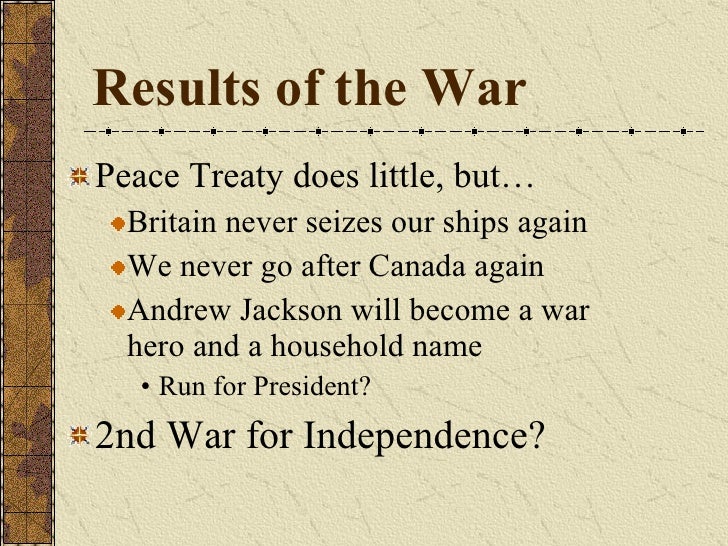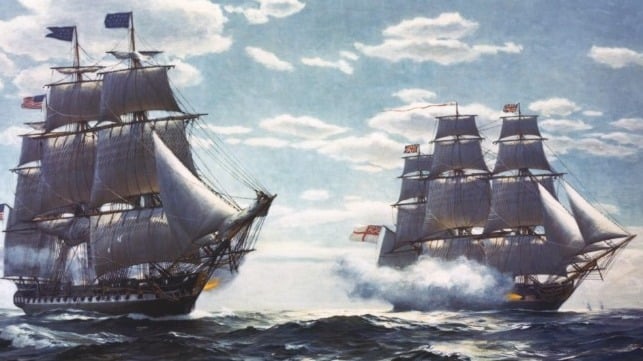6 Results Of The War Of 1812
- Events Of The War Of 1812
- 6 Results Of The War Of 1812
- 6 Results Of The War Of 1812 Fought
- 6 Results Of The War Of 1812 Civil War
Resources in NARA
Start studying Result of the War of 1812. Learn vocabulary, terms, and more with flashcards, games, and other study tools. February 18 – The Treaty of Ghent is declared; the War of 1812 is over. February 20 – USS Constitution engages the HMS Cyane and HMS Levant, not knowing the war was over. April 6 – Seven American prisoners are killed and 32 wounded in the “Dartmoor Massacre” at Dartmoor Prison in Devon, England. May 24 – Battle of the Sink Hole.

Genealogical Records of the War of 1812, article discussing Pension and Bounty Land Warrant Application Files, Military Service Records, and Naval and Marine Corps Records. Written by Stuart L. Butler, and published in Prologue 23:4 (Winter 1991).

Events Of The War Of 1812
War of 1812 Discharge Certificates, learn about discharge certificates and other records relating to the discharge of soldiers from the Regular Army, 1792-1815.
Genealogical fallout from the War of 1812, an article on Seamen's Protection Certificates written by Ruth Priest Dixon and published in Prologue 24:1 (Spring 1992).

Records about impressed seamen, 1793-1814, learn about records relating to the repatriation of American citizens impressed by foreign powers from the end of the American Revolution to the conclusion of the War of 1812.
Other Resources
- Index to the War of 1812 payrolls and muster rolls
- Word or phrase search provided by the Library of Virginia.
- Officers of the U.S. Navy and Marine Corps in the War of 1812
- List of all commissioned and warrant officers of the Navy and Marines on the Naval Historical Center web site.
- Star-Spangled Banner and the War of 1812
- Smithsonian site on the star-spangled banner.
- United States naval history: a biography
- Naval Historical Center bibliography on naval history by period.
- War of 1812
- Frequently asked questions about the War of 1812 at the Naval Historical Center.
- The War of 1812
- Chapter 6 from American Military History, part of the Army Historical Series of the Office of the Chief of Military History, U.S. Army.
Here is the final post in our series on the War of 1812, dealing with the situation of Britain, the United States, Canada, and Native Americans of the western frontier in the aftermath of the war.
After the Treaty of Ghent took effect in February 1815, the U.S. and Britain were officially at peace. But so had they been in 1812, when the war started; was anything different?
6 Results Of The War Of 1812
On the surface, the answer was clearly “no.” Neither the U.S. nor Great Britain gave up any territory during the war or as a result of the peace. That meant Britain was still sitting on the western frontier (at that time, Michigan, Wisconsin, Illinois, etc.). The British were free to continue to harrass U.S. settlement of its territories, and to ally with Native Americans to do so.
But they did not. The British no longer needed to keep the U.S. off-balance and in check. Now that there was no war between Britain and France for the Americans to join with France in fighting, Britain stopped doing all the things that had led the Americans to declare war: impressing U.S. sailors, capturing U.S. ships, harassing U.S. settlement. Britain concentrated its defensive efforts on maintaining Canada, and left the U.S. alone. Indeed, Britain was now anxious to engage in its profitable trade with the U.S. once again, and had no desire to weaken the new nation.

The U.S., for its part, was glad to go back to the status quo land-wise, no longer certain of its ability or desire to conquer Canada. With British pressure off the western frontier, the U.S. could focus on re-establishing its strength and reputation after the disastrous and embarrassing losses of the war. Washington DC was rebuilt and a modern navy was constructed—no more relying on gunboats to defend the U.S. coast or forts.
The areas of the U.S. that suffered after the war were New England and the Deep South. New England had opposed the war vigorously throughout and had been seen to ally itself with Britain; after the war, which most Americans saw as a massive victory (mostly because of the Battle of New Orleans), there was hostility toward the traitorous region. New England states had held a conference from December 1814-January 1815 at which they asked the federal government to give them back full control over their militia and their finances (they didn’t want to participate in the blockade or war taxation). Word spread that the New England conference was actually a secession conference, that New England wanted to leave the Union, and popular anger at the region was inflamed. It would take a few decades for New England to regain its standing in the eyes of the nation. New York took over as the most important city in the northeast, and Boston and New England took a backseat to that thriving metropolis.
In the Deep South, slaveholders had seen their fantasy that enslaved black Americans loved slavery exploded before their eyes by the numbers of enslaved people who ran away to join the British war effort. Promised their freedom if they did so, black Americans put themselves at great risk to aid the British. (They would be cruelly disappointed by their ally, for Britain launched a few very feeble efforts to resettle black Americans in howling wildernesses in Canada and overseas.) Slaveholders tried to convince themselves and the nation that this was an anomaly, but Denmark Vesey’s and Nat Turner’s slave uprisings in 1822 and 1831 showed it was not, and the South clamped down on enslaved Americans even harder.
Native Americans were losers in the war on a par with enslaved black Americans. The British withdrew their financial and military aid from Native Americans on the western frontier, who were left to face increasing white settlement with no leader to unify them and no money or ammo to fight. Native Americans either moved west or lived in segregation with white settlers. Their plight would worsen when the hero of New Orleans, Andrew Jackson, became president; an inveterate “Indian” hater, Jackson would set out to destroy all Native American groups within the U.S., most famously when he overturned a Supreme Court order protecting the Cherokees and sent them on their death march from Georgia to Oklahoma in 1838-9.
So at the end of the war we see the U.S. in a position to grow stronger and richer thanks to the constant threat of French or British harrassment being removed. Britain is the undisputed superpower of the world, and has no need to hassle the U.S. Slavery is threatened but viciously preserved in the southern U.S., the northeastern U.S. loses its pre-eminence over New York, and Native Americans are miminalized in the western U.S.

The War of 1812 did not have to happen. If the U.S. could have held off from entering into a trade agreement with France that was bound to provoke Great Britain to war, if the U.S. could have made itself as invisible as possible, suffering insults at sea and at home, from 1794 to 1814, the Napoleonic Wars would have ended on cue and suddenly the pressure would have been off and the nation could have gone straight to being Britain’s good trading partner and skipped the mostly disastrous war.
6 Results Of The War Of 1812 Fought
But 20 years is a long time to be insulted and invisible, and really, if the U.S. had allowed Britain to push it around entirely for 20 years, would the U.S. have seemed so desirable a partner by 1815? Perhaps not. The war itself strengthened the U.S. in important ways. The war taught the states that they needed to shake off their chronic unwillingness give the federal government any money and put out the cash needed to build an Army and Navy to defend itself. It taught the U.S. that it was not yet a major player in world affairs. It taught the U.S. that diplomacy was as important as an army and navy. Last, the War of 1812, despite the complaints and isolation of New England during the war, taught the U.S. that it was one unit, not just a group of unaffiliated states. It lived or died as a cooperative unit. The “Era of Good Feelings” that followed the war was the result of feeling that the states had been more closely welded together into a nation. The continuing fight over slavery would take over 40 years to rip that nation apart again.
The War of 1812 is not well-remembered today. It is a blip between the Revolution and the Mexican or even the Civil War. But the U.S. had a very great deal to lose in the War of 1812, and came very close to losing it all. This near-miss is worth a closer look.
but what were
the principal consequences???
LikeLike